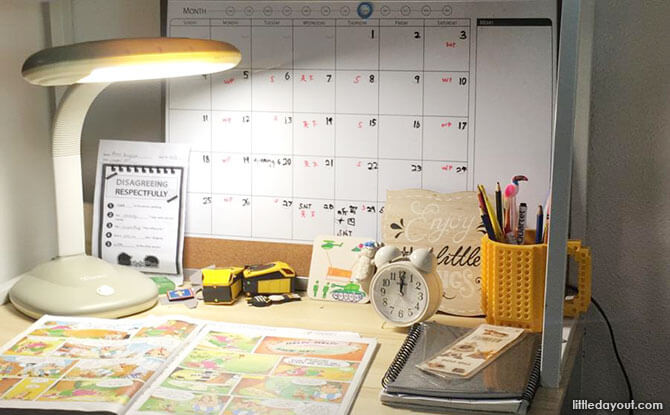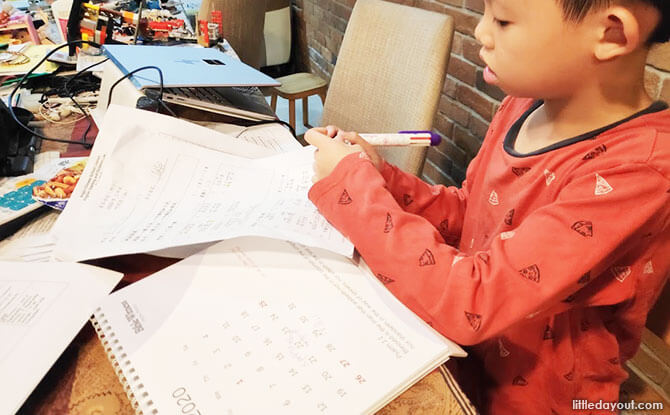
Our school-going children often face a multitude of things to do. Homework, revision, music practice and training sessions – many of these activities can turn into a chore, unless you have super disciplined kids. We might have a solution for you but it takes some consistency and effort from both you and your children to make things work – make a schedule with your kids!
You might be thinking – how do I set up a schedule? Fret not, we share with you some easy ways to come up with a schedule that everyone appreciates and also ways to enforce it. This can help both you and your child overcome some “free-spiritedness” on some days of the week.
How to Plan a Schedule with Kids
Most of us may be juggling careers and family life. Hence planning a schedule with the children would help them manage their school work and ease the load on parents. Ultimately, I firmly believe that the kids should be responsible for their own school work, sports practice, music practice and other to-dos.
1. Get the Kids Involved in Defining Tasks

BE PSLE-READY: Join Expert Educators for Revision Boosters to Empower P6 Students
BURP: Join the Sound Collector on a Whimsical Chase at Esplanade – Theatres on the Bay
WEEKEND IDEAS: Get Inspirational Ideas of Things to Do
First, sit your children down and ensure there are no distractions around. Ask your child to list out the to-dos and every task or daily responsibility.
For instance, aside from school work, there could be revision work for home, tuition centre’s work, theory work, music practice, sports practice, chores, reading time. Then allocate the amount of time accordingly to each type of work.
Getting your child to decide usually means more buy-in and he or she learns to plan the time required per subject or task, depending on how detailed you would like the schedule to be.
2. Assign the Time
After deciding on tasks, draw up the schedule for the week together with activities and co-curricular activities. Specify the time for each of the tasks. Lunch, for instance is from 2.30 pm to 3 pm followed by some down time till 3.30 pm and then homework time till 4.30 pm.
This should also be agreed upon by both parent and child. I would choose some playground or outdoor time after homework so there is some rest for the eyes and an incentive to finish the work on time. I would also include some screen time to incentivize the completion of certain tasks if they were done well and finished punctually.
3. Calendar or Monthly Planner for Spelling, 听写, Assessment and Examination Dates

This would be more applicable for older primary school children who have more assessments to manage. Give your child a desk or wall calendar, or planner that can be used for marking down of important dates for spelling or oral examinations, termly assessments.
This gives the child a sense of responsibility as to what revision needs to be done and the kind of weightage of tests or examinations. You can also plan together with your child when revision should begin in preparation for tests and examinations.
Experienced parents often tell us that consistency is key and way more effective than last minute cramming.
4. Put the Schedule on the Wall
Of course, pin the schedule on the wall or at the child’s desk and a visible spot where it is easy to refer to. You might even want to personalise it with your child’s name in glittery letter stickers. Stickers are usually a crowd-pleaser.
5. Have a Clock or Watch that is Visible

The clock will help keep time and also guides the child into tracking the duration for each task. No excuses for not knowing the time! Time and tide wait for no man – and the ticking clock is a sure reminder of that.
6. Encourage and Incentivise
Don’t worry about mistakes, failures or forgetting important dates. It is all part of the learning process. We can keep encouraging our children in areas they are improving in and remind them when they fall short.
You might even want to incentivize them for taking the initiative to complete tasks that are not listed in the schedule with special bubble tea treats or outings to an amusement park.
Use the Timetable as a Tool to Inculcate Values
Don’t use the timetable for the sake of using one. Spontaneity should be embraced once in a while as we don’t need to be so draconian about schedules. While running a tight ship is unrealistic for most, it’s about guiding young lives to be independent, responsible individuals that value-add to society that is our ultimate objective.
Envisioning how we would like our children to be like in the future may help in our roles as nurturing parents.





















